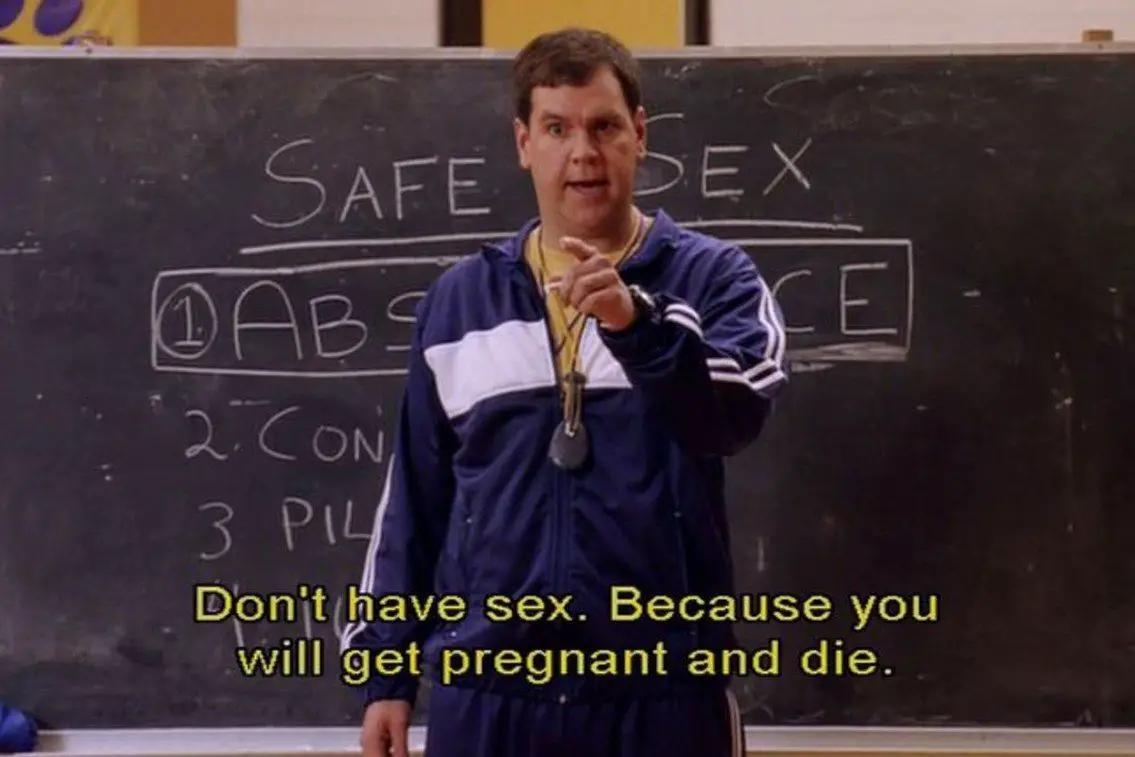“Don’t have sex, because you will get pregnant and die.”
It’s a laughable statement that everyone past a certain age knows to be untrue. Nevertheless, the classic “Mean Girls” line remains as hilarious as it is blatantly incorrect. The now-famous scene features a chalkboard in the background with a list of key rules for safe sex, and at the top, a single word: abstinence.
This is what was taught at the fictional high school during their first health class. It seems utterly ridiculous, but what’s even more ridiculous is the fact that this happens in high schools today.
My High School Sex-Ed Course
I was a freshman in the fall of 2017. I can lucidly recall the days in health class dedicated to sex education. At 8:15 a.m. sharp, all 400 or so members of my freshman class poured into the auditorium, bleary-eyed and exhausted. Health class was usually held in our normal classrooms, but on this day, we awaited the sage words of a guest speaker in the high school gymnasium.
At this point, most of us were 14 years old. A week prior, in the same class, all four male students in our 30-person unit admitted to their complete lack of knowledge regarding how to use a tampon. Evidently, the sex ed administered to us in the 5th grade had failed us, setting the unfortunate tone for the remainder of our curriculum.
For two 90-minute class periods, a small woman of perhaps 40 delivered to us the entire sex ed curriculum we would receive for the rest of our academic lives. The key takeaways from her lesson are as follows:
- Do not, under any circumstances, have sex before marriage.
- If you disregard the first rule, you are liable to get pregnant or catch an STD, either of which will lead to your untimely death.
- Condoms, the sole form of birth control mentioned, do not work. Nor does “pulling out.”
Over the course of three collective hours, this is all our guest speaker managed to convey to our young, clueless minds. Afterward, we were even invited to sign abstinence pledges.
There are two key facts to bear in mind when considering this experience of mine. First, the lectures were absent of accurate information or any mention of safe sex procedures. Second, I went to school in one of the more progressive areas of Metro Atlanta, at a school that prided itself on diversity and academic strength.
It turns out that regardless, we were still unable to avoid a “Mean Girls” style sex education course. Classmates of mine, familiar with online GIFs and memes from the “Mean Girls” movie, snickered with each other among the rows.
Abstinence-Only Classes Don’t Work
When I tell people about this experience, they are apt to inform me that it was just two days, and none of it was serious anyway. This is entirely untrue. Abstinence classes as a replacement for sex education are a disservice to school children in more ways than one. When considering the angle these abstinence classes take with regard to sexuality, it becomes abundantly clear that abstinence classes under the guise of sex ed promote conservative or Christian values and place purity culture above safety.
It’s by no means wrong to adhere to Christian values, but public school education is meant to be secular. Despite this, Christian agendas managed to seep into spaces that should be strictly educational. Furthermore, abstaining from sex until marriage was discussed as if it were the only valuable safe sex practice. While it’s obvious that someone can’t get pregnant if they never have sex, it is also proven that condoms are around 98% successful in preventing pregnancy. They are considered to be effective in preventing the transmission of certain STDs as well.
It goes without saying that the emphasis on purity over safety is harmful regardless of where it stems from. Teaching students that they should not have sex — and if they do, that any disastrous outcome is their fault — instills within young people shame and distrust regarding their sexuality. Instead of having safe outlets and resources for birth control, prenatal care, etc., youth who are subjected to abstinence classes may be more likely to resort to unsafe and unreliable methods, believing that the medical system will not support them.
Beyond this, those who endured this two-day course at my school were left with a lifetime of scarring and miseducation, and the same goes for students at any other school where this is considered acceptable. To this day, a good portion of my friends — people who can drive, vote and drink alcohol — have no idea what their birth control actually does, and have no clue where to get tested for sexually transmitted diseases. For young members of the LGBTQ+ community, knowledge of proper safe sex procedures is hard to come by and is definitely not touched on in most public schools.
Abstinence class is not a replacement for proper sex education. Parents’ concerns regarding exposing their children to sensitive content are valid, but they should by no means interfere with sex ed that serves the purpose of keeping students healthy. A teenager who will inevitably engage in sexual activity is far better off knowing how to do so safely. In fact, three in ten girls are likely to become pregnant at least once during their teens. If sex educators kept that statistic in mind, maybe they’d refrain from scaring teenagers into believing sex and pregnancy lead to death.
If we want future generations to be safe, they should receive proper sex education. Every gender should be taught both what their body does and what the bodies of others do. Each student should know how to have safe sex, where to get any necessary tools to do so and who they can turn to if something unexpected happens. No student should be ashamed or clueless about the natural functions of their or their potential partner’s body.
It’s time to put the education back in sex education.

















